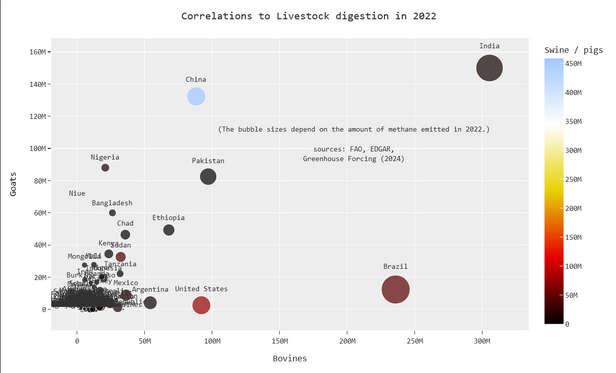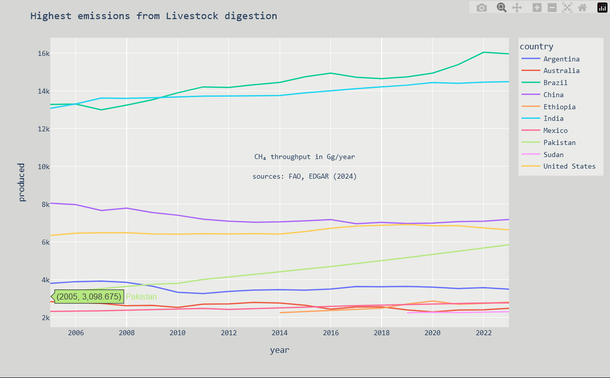Recent searches
Search options
Some activities are forcing climate change
Livestock digestion emits too much methane:
* People farm too many bovines in India, Pakistan, Brazil, United States, China;
* People farm too many goats in India, Pakistan, China;
* People farm too many pigs in China and the United States.
(The bubble sizes depend on the mass of methane emitted in 2022)
CH4 emissions from livestock digestion:
* Pakistan doubles emissions between 2005 and 2024.
* Pakistan and Brazil each emit 3,000 Gg/year more in 2023 than in 2005.
@maugendre @agriculture @climate
Simple addition of a tablespoon of seaweed cuts bovine methane by large percentages. Far more than the entire onset of vegetarianism in history.
And it could happen overnight.
University of California says 40%
https://www.universityofcalifornia.edu/news/feeding-grazing-cattle-seaweed-cuts-methane-emissions-almost-40-percent
Another study showed 52% reduction in methane.
"The results? Methane released by the seaweed-eating cows was 52% less on average than their non-seaweed-munching counterparts"
@kevinrns @maugendre @agriculture @climate This is not a new idea, and every other study that's been done has come with a load of caveats, like:
Cows don't like the taste and will eat less if the percentage is too high.
It's uncertain if enough of the seaweed is available to make a difference. It's not a thing that's currently harvested in quantities enough to supplement feed.
It's almost certainly going to be more expensive to produce this type of feed. Current research has involved lab produced feeds - it's not a commercial product yet as far as I know, so it's not going to happen particularly soon, as I suspect it hasn't yet got any approvals for general use.
Even if a way was found to do this, you would have to find a way to get all dairy and meat farmers to use feed containing seaweed, globally.
Most cows generally don't eat 100% feed - a large proportion globally are put out to graze, and you can't add it to grass in fields. Accounting for that, the percentage methane reduction is much lower than 40% overall.
To be honest, it's just greenwashing.
@kevinrns @maugendre @agriculture @climate Well that's a well-formed argument. Could say the same about feeding seaweed to cows.



